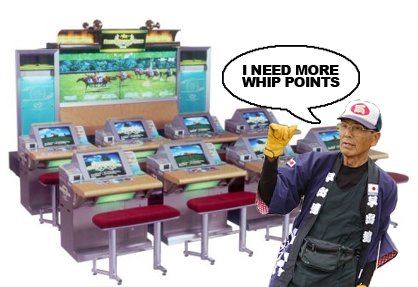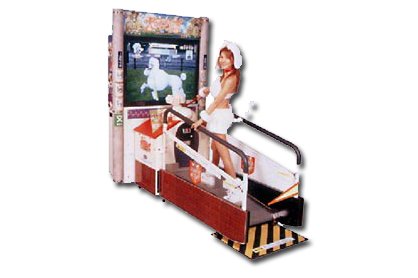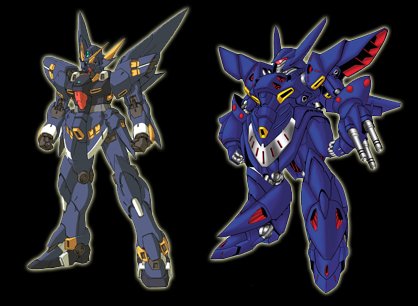The Bluffer’s Guide to Japanese Gaming
Your Japanese game crib sheet: don’t leave home without it
Derby Owners Club
Publisher: Sega
Imagine if those rusty mechanical horse-racing games hadn’t become antiquated funfair curios. What if they’d evolved into a terrifying, eight-tentacled monster that required half the floor space in the average arcade? And what if wayward kids with fags stuck to their lips, too cool for school but not for a quick flutter on the gee-gees, turned them into a Japanese game Goliath?

Taking its lead from the old Derby Stallion games (million-sellers on both Super Famicom and PlayStation), with eight satellite stations around its giant screen, Derby Owners Club is that monster. As owner, trainer and jockey, each player uses pre-purchased cards to power up their stables. Once out of the gates, they use Whip Points to thrash their horses to victory.
Inu No Osanpo (Let’s Take The Dog Walking)
Publisher: Sega
More curio than phenomenon, Sega’s treadmill based simulator took Japanese arcades by, erm, surprise when it arrived in 2001. You climb on, take the leash (attached to a plastic dog), and with carefully timed tugs keep your mutt under control against entirely surmountable odds. Yes, that does mean letting him piss up a lamppost when certain icons appear, or negotiating perilous QTE challenges to stop him running in front of cars and bicycles. The bonus stage: chasing a cat. If Shenmue involved turds rather than sailors, it wouldn’t be too far off.

Above: Yes it's small, but this image is just too good not to use
Sega Ages
Publisher: Sega
Sign up to the GamesRadar+ Newsletter
Weekly digests, tales from the communities you love, and more
You may remember some of these from a few years back, highlights including revamped versions of Space Harrier and Monaco GP. Unlike you, though, the Japanese didn’t forget. The Ages series continues to churn out re-releases and compilations for PS2, the most recent being 'complete' collections of Fantasy Zone and Phantasy Star, and revised versions of Virtual-On and Galaxy Force II. The series never went beyond Volume 13 in the West, but on home soil it’s at 33 and counting. Our favourite’s Volume 26: Dynamite Deka (known over here as Die Hard Arcade).
Super Robot Taisen
Publisher: Banpresto / Bandai
Known as Super Robot Wars in the West - but in no way associated with killing machines made out of dildos and bottle-tops. Instead, this is tactical mecha combat (big stompy robots) at its most accessible, if also most convoluted.

Above: Let's face it. Nothing kicks ass quite as hard as giant robots
Known for dragging all kinds of game and anime brands into its sprawling stories, it’s spawned a monstrous array of games since its debut on Game Boy in 1991. The most recent, Super Robot Taisen XO, appeared on Xbox 360 in 2006, marking the series’ first online multiplayer mode.
Sengoku Basara
Publisher: Capcom
A more recent series that’s now starting to snowball, Sengoku Basara is Capcom’s take on the Samurai Warriors fiction. Clearly, the Japanese like slaughtering their ancestors so much that, when Resi 4 producer Hiroyuki Kobayashi added DMC-style characters and attacks, sequels were inevitable.
The hacking and slashing protagonist this time is Date Masamune, a cocksure warrior general in the Dante vain. However, because we westerners are a bunch of idiot savants less interested in feudal lore than collectible piggy banks, Capcom removed all historic references from our version of the game, Devil Kings. For us, it’s the usual voodoo mumbo-jumbo, full of duelling gods and - zzzzzzzzzz.
Neon Genesis Evangelion
Publisher: Various
It’s been said that gamers in the west - hardcore importers included - know less than a tenth of the games available in Japan. On the tip of the iceberg sit games like the Neon Genesis Evangelion series, based on better-known anime but never released in the West.

Above: We drew a blank on the strip mah-jong games, so have a picture of this cosplay cutie doing her best to look like Evangelion's Rei Ayami. And holding some gravure as an added visual bonus
For platforms such as Saturn, Dreamcast, PS2 and PC, Neon Genesis Evangelion has adorned fighting games, RPGs, typing games, card games, strip mah-jong games, murder mysteries... over 20 titles in all. When you consider the dozens of lesser-known, equally prolific anime to have spawned their own games, the global tally rises exponentially.


